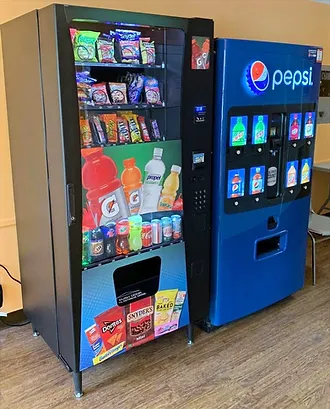
Purchasing a used vending machine can be an excellent way to save money while expanding or starting your vending business. However, it’s essential to approach the process with careful consideration to ensure you’re making a wise investment. Here’s a detailed guide on what to look for, what questions to ask, and how to evaluate your purchase.
What to Look for When Inspecting a Used Vending Machine
When examining a used vending machine, inspect the following:
- Physical Condition:
- Look for visible signs of wear and tear, such as dents, rust, or damaged panels.
- Check that the machine door seals properly to prevent tampering and keep products fresh.
- Functional Components:
- Test the coin and bill acceptors to ensure they’re working correctly.
- Verify that the card reader (if available) functions properly.
- Test all selection buttons and ensure products dispense correctly.
- Confirm the machine’s refrigeration system (for cold items) operates efficiently and maintains proper temperatures.
- Electrical and Software:
- Inspect the wiring for damage or loose connections.
- Ensure the digital display is clear and functional.
- Check the software version, as outdated systems may lack modern features.
- Capacity and Compatibility:
- Ensure the machine’s capacity aligns with your product needs.
- Confirm it can accommodate modern-sized snacks, beverages, or specialty items.
Potential Problems to Look For
- Malfunctioning Components: Broken coin mechanisms, jammed dispensers, or refrigeration issues can be costly to repair.
- Outdated Models: Machines with obsolete parts or limited support from manufacturers.
- Hidden Damage: Rust or internal damage that might not be immediately visible.
- Poor Energy Efficiency: Older machines might consume more electricity, increasing operating costs.
Questions to Ask the Seller
- History of the Machine:
- How old is the machine?
- Has it undergone regular maintenance? If so, ask for records.
- Why is the machine being sold?
- Condition and Functionality:
- Are all components fully functional?
- Has it had any significant repairs or replacements?
- Does it comply with ADA requirements?
- Ownership and Documentation:
- Do you have the original purchase receipt?
- Is there a warranty, and is it transferable?
- Are there manuals or guides available for operation and maintenance?
How Much Should You Spend on a Used Vending Machine?
The cost of a used vending machine typically ranges from $1,000 to $4,000, depending on factors like age, condition, and features. Machines with modern payment systems and warranties are likely to cost more but may save you money in the long term.
Where to Check the Value of a Used Vending Machine
Here are some websites to help determine a machine’s value:
- eBay (www.ebay.com): Search for similar machines to gauge market value.
- Craigslist (www.craigslist.org): Look for local listings to compare prices.
- Facebook Marketplace (www.facebook.com/marketplace): Offers peer-to-peer sales with varying conditions.
- Vending Connection (www.vendingconnection.com): Features classified ads for used vending machines.
- UsedVending (www.usedvending.com): Specializes in vending equipment and includes pricing information.
Pros and Cons of Buying a Machine with a Warranty
Pros:
- Provides peace of mind with protection against mechanical failures.
- Often includes access to technical support or discounted repairs.
Cons:
- Machines with warranties may have a higher initial cost.
- Warranty terms might not cover all types of repairs.
Without Warranty:
- Lower upfront costs.
- Greater risk of unexpected repair expenses.
Buying Options: On Location vs. Machine Only
- Buying On Location:
- Pros:
- Immediate revenue stream.
- Established customer base.
- Cons:
- Higher upfront costs to acquire both machine and location.
- Less flexibility in moving the machine.
- Pros:
- Buying Machine Only:
- Pros:
- Freedom to choose a location.
- Lower cost.
- Cons:
- Requires effort to secure a profitable location.
- Potential downtime before generating revenue.
- Pros:
Final Thoughts
Purchasing a used vending machine can be a savvy move if approached with diligence. Take the time to inspect the machine thoroughly, ask critical questions, and weigh the pros and cons of warranties and location options. By doing your homework, you’ll set yourself up for success in the vending industry.



